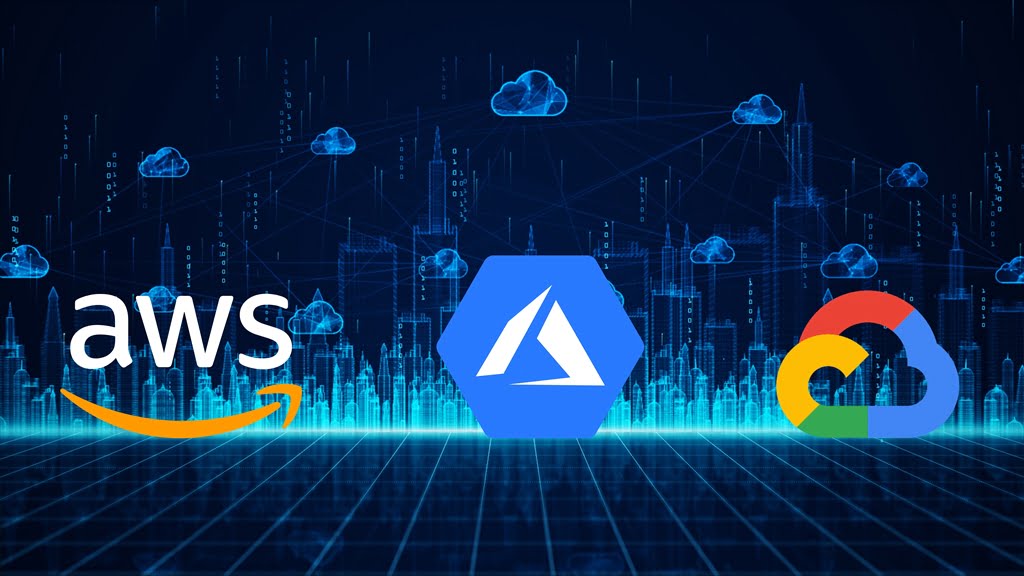
Are you trying to decide which cloud platform is the best for your business? Look no further! This blog post is your ultimate guide to , AWS vs Azure vs Google Cloud . We’ll cover the features, benefits, and drawbacks of each platform, so you can make an informed decision about which cloud platform is right for you. Get the facts and make the best decision for your business today!
Before dive in want a recap ? – What is Cloud Computing? Everything you need to know about cloud services explained.
Explanation of the importance of choosing the right cloud platform for businesses – aws vs azure vs google cloud cloud services comparison
Choosing the right cloud platform is crucial for businesses. It enables them to access powerful computing resources, store and process large amounts of data, and deploy applications quickly and efficiently. Cloud platforms also offer scalability and reliability, so businesses can easily adjust their capacity to meet their changing needs.
Brief overview of AWS, Azure, and Google Cloud
AWS, or Amazon Web Services, is the largest cloud platform in the world. It offers a broad range of services, including compute, storage, database, analytics, networking, and more. Azure is Microsoft’s cloud platform, and it provides a comprehensive set of cloud services, including compute, storage, networking, analytics, and AI. Google Cloud is Google’s cloud platform and it provides a suite of cloud services, including compute, storage, networking, analytics, and machine learning.
Features of AWS

Computing Services

AWS also offers a range of computing services, including EC2, which is a web service that provides secure, resizable compute capacity in the cloud. It allows users to launch virtual servers, called instances, in minutes. EC2 also offers features like Elastic Load Balancing, Auto Scaling, and Amazon Machine Images (AMI).

Lambda, an event-driven compute service that can run code in response to events, is also offered by AWS. Lambda is a serverless compute service that allows users to run code without having to manage any servers. Server management is not a concern when building and running applications and services using it.

AWS also offers Elastic Beanstalk, which is an easy-to-use service for deploying and scaling web applications and services. It automates the process of deploying and scaling applications, so users don’t have to worry about managing servers or writing configuration code. It also provides a range of features that can be used to monitor and manage applications.
Storage Services

AWS also offers a range of storage services, including S3, which is an object storage service. It provides users with secure, durable, and highly-scalable storage for data and applications. S3 also offers features such as versioning, lifecycle policies, and encryption, so users can store and manage their data securely.
AWS also offers Glacier, which is an archival storage service. It provides users with secure, durable, and cost-effective storage for long-term data archiving. Glacier also offers features such as lifecycle policies, cross-region replication, and encryption, so users can store and manage their data securely. Additionally, Glacier is cost-effective, as users only pay for the storage they use.
Database Services

AWS also offers a range of database services, including RDS, which is a relational database service. It allows users to set up, operate, and scale a relational database in the cloud. RDS also offers features such as automated backups, so users can back up their data quickly and easily.

AWS also offers DynamoDB, which is a fully-managed, non-relational database service. It allows users to create and manage highly-scalable databases quickly and easily. DynamoDB also offers features such as encryption, so users can store and manage their data securely.

AWS also offers Redshift, which is a fully-managed, petabyte-scale data warehouse service. It allows users to quickly and easily analyze large amounts of data. Redshift also offers features such as encryption, so users can store and manage their data securely.
Benefits of Azure

Hybrid Cloud Capabilities
Azure also offers hybrid cloud capabilities, which allow users to build and manage applications across on-premises and cloud environments.
Azure also offers Azure Arc, which is a multi-cloud management service. It allows users to manage and govern their resources across multiple clouds, including Azure, AWS, and Google Cloud. Azure Arc also offers features such as automated provisioning, so users can quickly and easily deploy and manage their applications.
Azure also offers ExpressRoute, which is a private connection between an organization’s on-premises infrastructure and the Azure cloud. It allows users to access Azure services without having to use the public internet. ExpressRoute also offers features such as enhanced security, so users can securely connect to the Azure cloud.
AI and Machine Learning Services
- Azure Cognitive Services
Azure also offers Cognitive Services, which are a collection of AI and machine learning services. It allows users to create intelligent applications that can understand natural language, recognize objects in images, and more. Cognitive Services also offers features such as automated machine learning, so users can quickly and easily build and deploy AI models. Additionally, Cognitive Services is cost-effective, as users only pay for the resources they use. Furthermore, Cognitive Services can be used to create intelligent applications that can understand natural language, recognize objects in images, and more. Finally, Cognitive Services is easy to use, as it can be managed and monitored from the Azure portal.
- Azure Machine Learning
Azure also offers Azure Machine Learning, which is a fully-managed cloud service for creating and deploying machine learning models. It allows users to quickly and easily build, deploy, and manage their machine learning models. Azure Machine Learning also offers features such as automated machine learning, so users can create and deploy models without having to write any code. Additionally, Azure Machine Learning is cost-effective, as users only pay for the resources they use. Furthermore, Azure Machine Learning can be used to create and deploy machine learning models that can be used to make predictions and decisions. Finally, Azure Machine Learning is easy to use, as it can be managed and monitored from the Azure portal.
- Azure Databricks
Azure also offers Azure Databricks, which is a fully-managed cloud service for data engineering and data science. It allows users to quickly and easily build and manage data pipelines and machine learning models. Azure Databricks also offers features such as automated machine learning, so users can create and deploy models without having to write any code. Additionally, Azure Databricks is cost-effective, as users only pay for the resources they use. Furthermore, Azure Databricks can be used to create data pipelines and machine learning models that can be used to analyze data and make predictions. Finally, Azure Databricks is easy to use, as it can be managed and monitored from the Azure portal.
Security and Compliance
- Azure Security Center
Azure also offers Azure Security Center, which is a fully-managed cloud service for security and compliance. It allows users to quickly and easily monitor their resources for potential security threats. Azure Security Center also offers features such as automated security assessments, so users can identify and remediate security issues.
- Azure Active Directory
Azure also offers Azure Active Directory, which is a fully-managed cloud service for identity and access management. It allows users to quickly and easily manage user identities and access control. Azure Active Directory also offers features such as single sign-on, so users can securely access multiple applications with a single username and password.
- Azure Policy
Azure also offers Azure Policy, which is a fully-managed cloud service for policy compliance. It allows users to quickly and easily define and enforce policies across their resources. Azure Policy also offers features such as automated policy enforcement, so users can ensure compliance with corporate policies.
Features in Google Cloud Platform (GCP)

GCP offers a range of features to help users manage their cloud resources. Google Cloud includes features such as Cloud Storage, which is a fully-managed cloud service for storing and managing data. GCP also feature Cloud Functions, which is a serverless platform for running code.
Google Workspace is a suite of cloud-based collaboration and productivity tools that can be used with GCP. It includes tools such as Gmail, Calendar, Drive, Docs, Sheets, and more. These tools can be used to collaborate on projects, manage tasks, and store data securely.
GCP also offers enterprise android, which is a fully-managed cloud service for mobile device management. It allows users to quickly and easily manage their mobile devices and applications. Enterprise android also offers features such as automated device provisioning, so users can quickly set up their devices.
GCP offers Chrome OS, a cloud-based operating system designed to make it easier for users to access their data and applications from any device. It provides a secure environment for users to store and access their data, and it is designed to be easy to use and manage. Chrome OS also offers a range of features such as automatic updates, built-in virus protection, and access to the Google Play Store. With Chrome OS, users can access their data and applications from anywhere, making it a great choice for businesses and individuals who need to stay connected., which is a fully-managed cloud service for managing Chromebooks. It allows users to quickly and easily manage their Chromebooks and applications. Chrome OS also offers features such as automated device provisioning, so users can quickly set up their devices.
Limited Availability Zones
- GCP offers Limited Availability Zones , which are isolated locations within a region that provide low-latency and high-availability services. Availability Zones are designed to help users protect their applications and data from outages, and they are ideal for applications that require high availability and low latency.
- Comparison of Google Cloud’s Availability Zones to AWS and Azure Google Cloud’s Availability Zones are designed to provide users with high availability and low latency services. In comparison to AWS and Azure, Google Cloud’s Availability Zones are designed to provide users with more flexibility and control over their applications and data.
Less Mature Ecosystem
- A mature ecosystem is one that has been around for a while and has many established tools and services. It is typically more reliable and has more features than a less mature ecosystem. Google Cloud Platform has a less mature ecosystem than Amazon Web Services and Microsoft Azure, meaning that there are fewer tools and services available, and they may not be as reliable.
- Comparison of Google Cloud’s ecosystem to AWS and Azure Google Cloud Platform’s ecosystem is less mature than Amazon Web Services and Microsoft Azure, but it is still a great choice for businesses and individuals who need reliable cloud services. Google Cloud Platform offers a variety of services, such as GCP, Google Workspace, Enterprise Android, Chrome OS, and Limited Availability Zones, which can be used to manage applications and data.
Limited Support
- Explanation of Google Cloud’s support options
Google Cloud Platform provides limited support options for users, including a help center, documentation, and community forums. Additionally, users can contact Google Cloud Platform support via email or phone for more personalized assistance. However, there is no on-site support available, and users may have difficulty getting help for more complex issues. Furthermore, Google Cloud Platform’s support team may take longer to respond to inquiries than other cloud providers. Finally, Google Cloud Platform’s support team is available 24/7, so users can get help whenever they need it.
- Comparison of Google Cloud’s support to AWS and Azure
Google Cloud Platform’s support options are more limited than those offered by Amazon Web Services and Microsoft Azure. For example, Google Cloud Platform does not offer on-site support, and its support team may take longer to respond to inquiries than other cloud providers. Additionally, Google Cloud Platform does not offer as many support options as AWS or Azure, such as 24/7 technical support or a dedicated account manager. However, Google Cloud Platform does offer a help center, documentation, and community forums, which can be used to find answers to common questions.
Comparison of Pricing – AWS vs Azure vs Google Cloud
- Explanation of how general cloud platform pricing works
Most cloud platforms use a pay-as-you-go model, meaning users are only charged for the services they use. This makes it easier for users to control their costs and scale their applications as needed. Additionally, cloud providers often offer discounts for long-term commitments and for using their services in bulk. Finally, some cloud providers may offer free tiers for certain services, allowing users to try out their services without incurring any costs.
Comparison of AWS , Azure and Google Cloud Platform’s pricing
Amazon Web Services and Microsoft Azure offer a pay-as-you-go model, as well as discounts for long-term commitments and bulk usage. Google Cloud Platform (GCP) also offers a pay-as-you-go model, but it does not offer discounts for long-term commitments. However, Google Cloud Platform does offer free tiers for certain services, allowing users to try out their services without incurring any costs.
Comparison of Google Cloud’s Pricing to AWS and Azure
Google Cloud Platform’s pricing options are generally more competitive than those of Amazon Web Services and Microsoft Azure. Google Cloud Platform offers pay-as-you-go, subscription-based, and free tiers, while AWS and Azure offer subscription-based and pay-as-you-go pricing.
Comparison of AWS, Azure, and Google Cloud pricing for various services
When it comes to pricing for specific services, all three cloud providers offer different pricing models. For example, AWS and Azure offer per-minute pricing for virtual machine (VM) instances, while Google Cloud Platform offers per-second pricing.
Conclusion – AWS vs Azure vs Google Cloud
- Summary of the features, benefits, and drawbacks of AWS, Azure, and Google Cloud
In conclusion, all three cloud providers offer different pricing models and features. Amazon Web Services and Microsoft Azure offer a pay-as-you-go model, as well as discounts for long-term commitments and bulk usage. Google Cloud Platform (GCP) offers a pay-as-you-go model, as well as discounts for customers who use its services in bulk, and free tiers for certain services.
- Recommendation for which cloud platform is best for different types of businesses
For businesses that need scalability and flexibility, Amazon Web Services and Microsoft Azure are the best options. Considering businesses that prioritize cost-effectiveness, Google Cloud Platform is the best choice. For businesses that need to process large amounts of data quickly, AWS and Azure both offer powerful analytics and machine learning services.
- Final thoughts and call to action.
In conclusion, when it comes to AWS vs Azure vs Google Cloud , computing can provide businesses with the scalability, flexibility, and cost-effectiveness they need to succeed. By carefully evaluating each cloud provider’s features, benefits, and drawbacks, businesses can find the best solution for their needs. Ultimately, cloud computing can help businesses save time and money, and enable them to focus on their core business objectives. For businesses looking to take advantage of cloud computing, now is the perfect time to start.







0 Comments